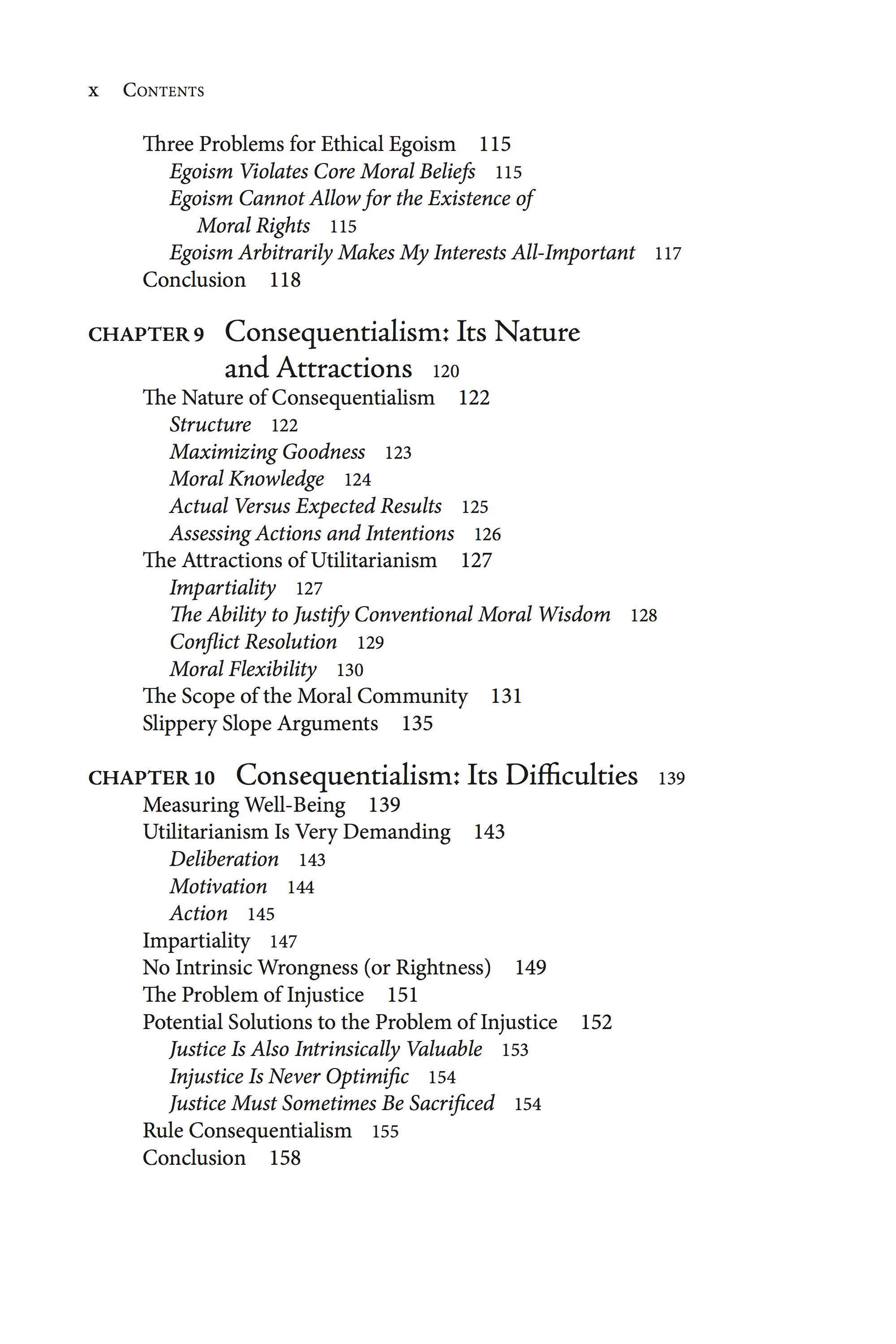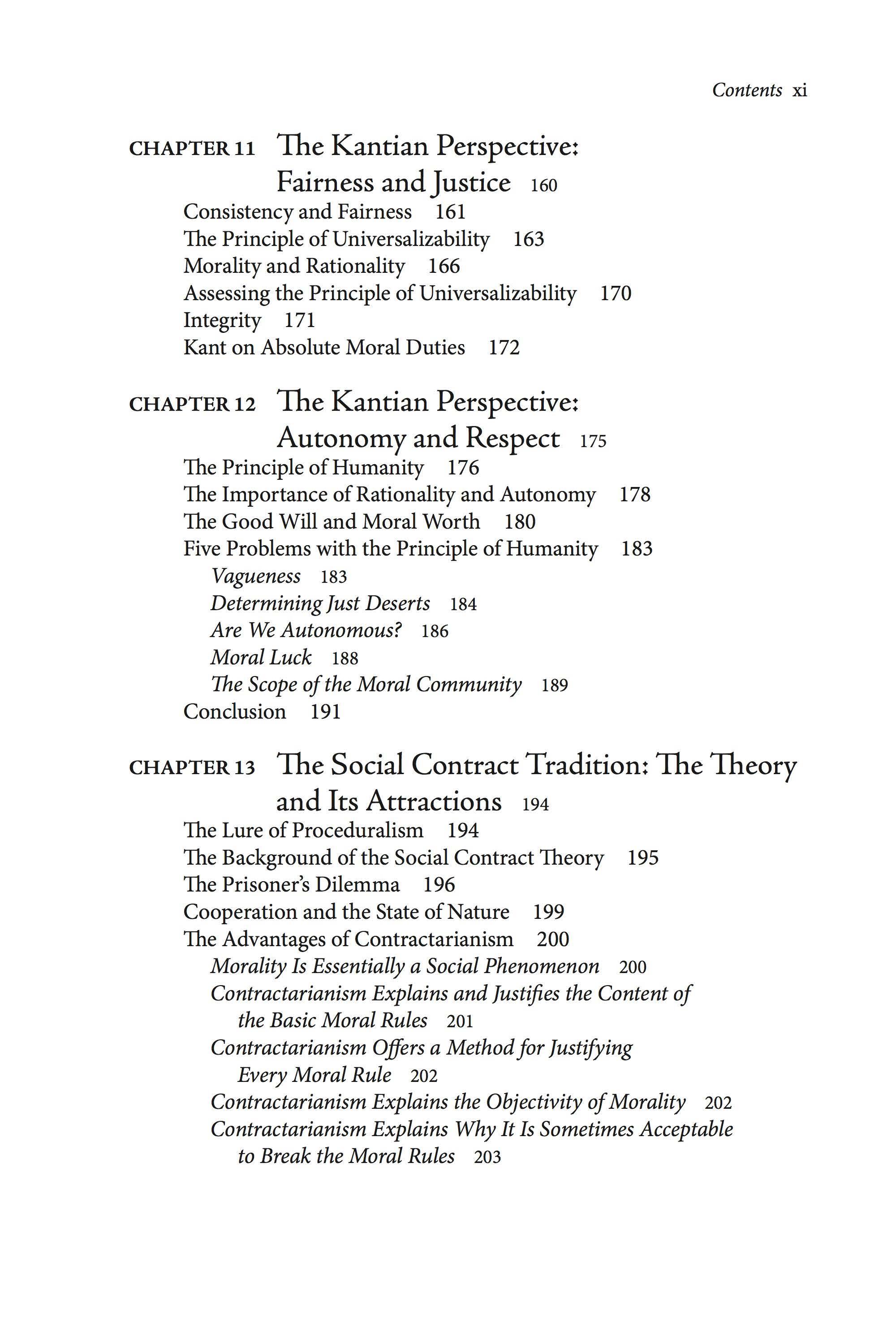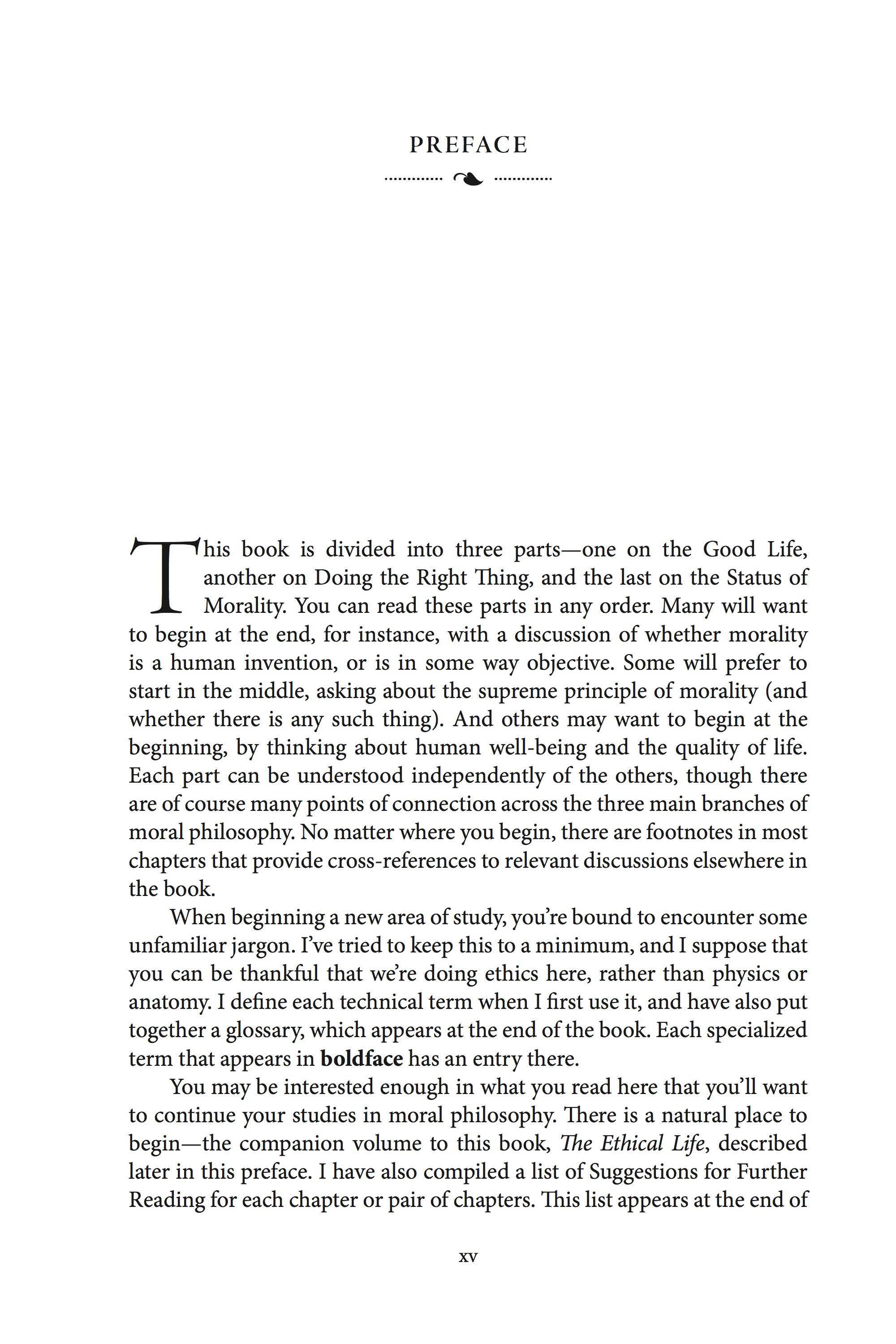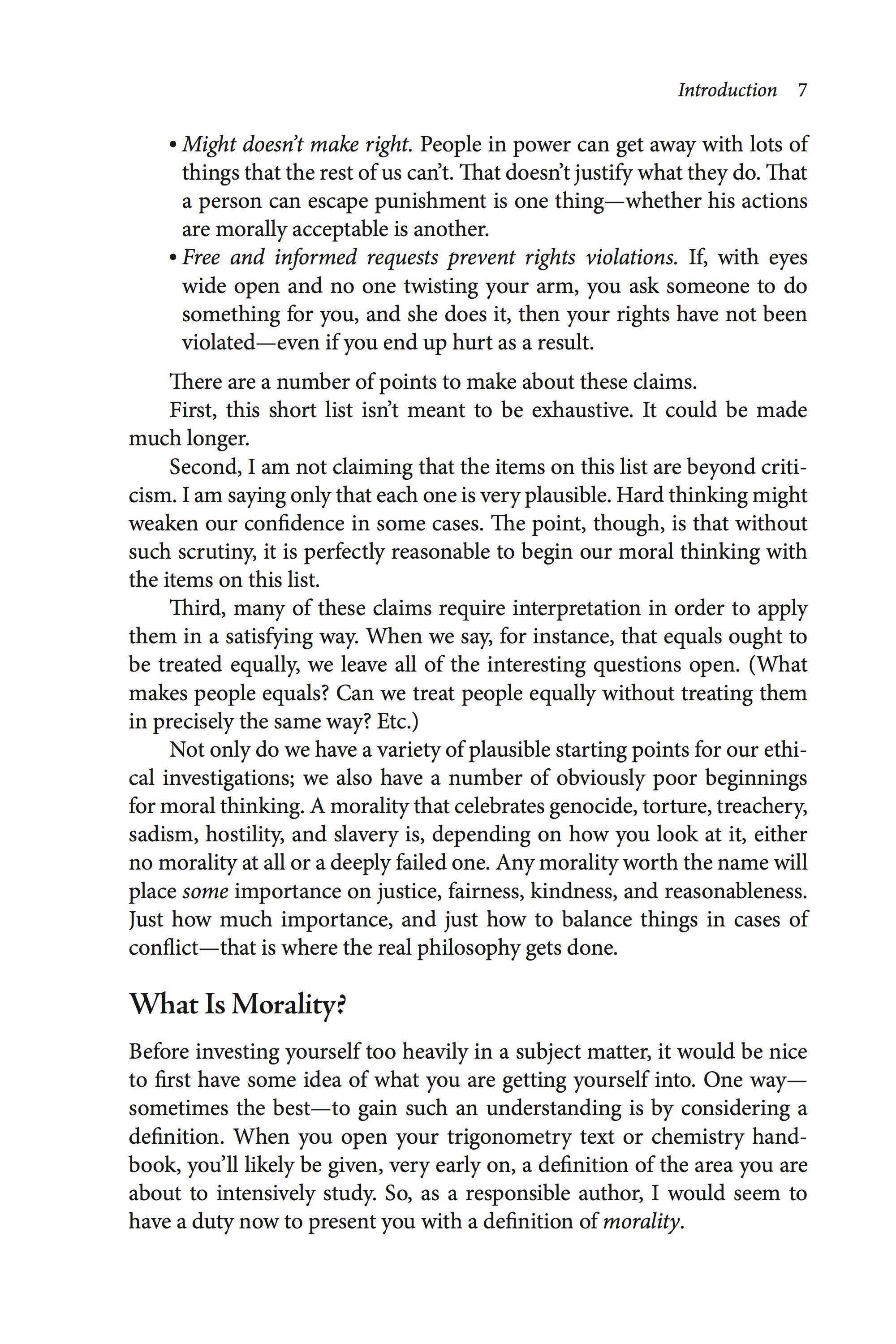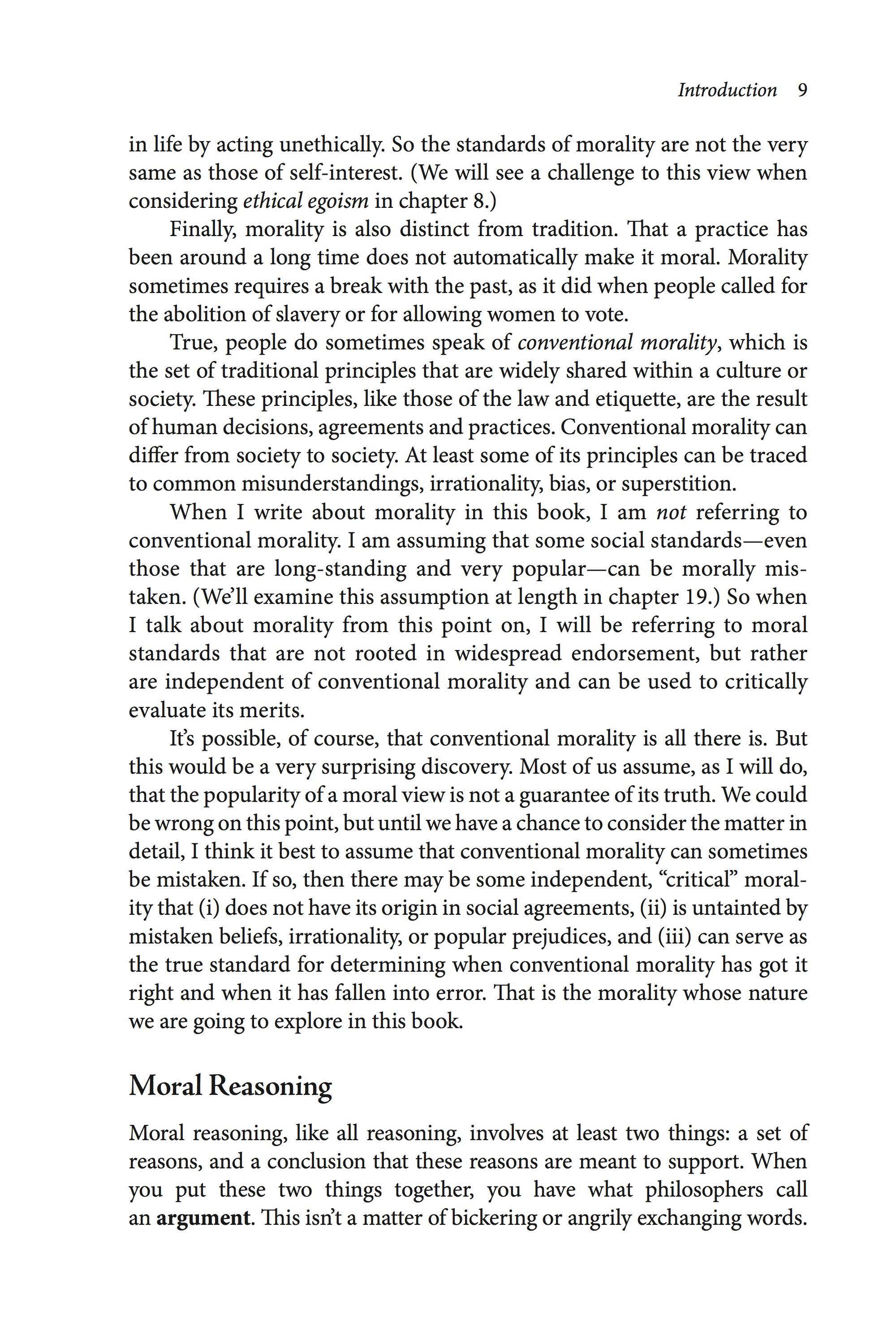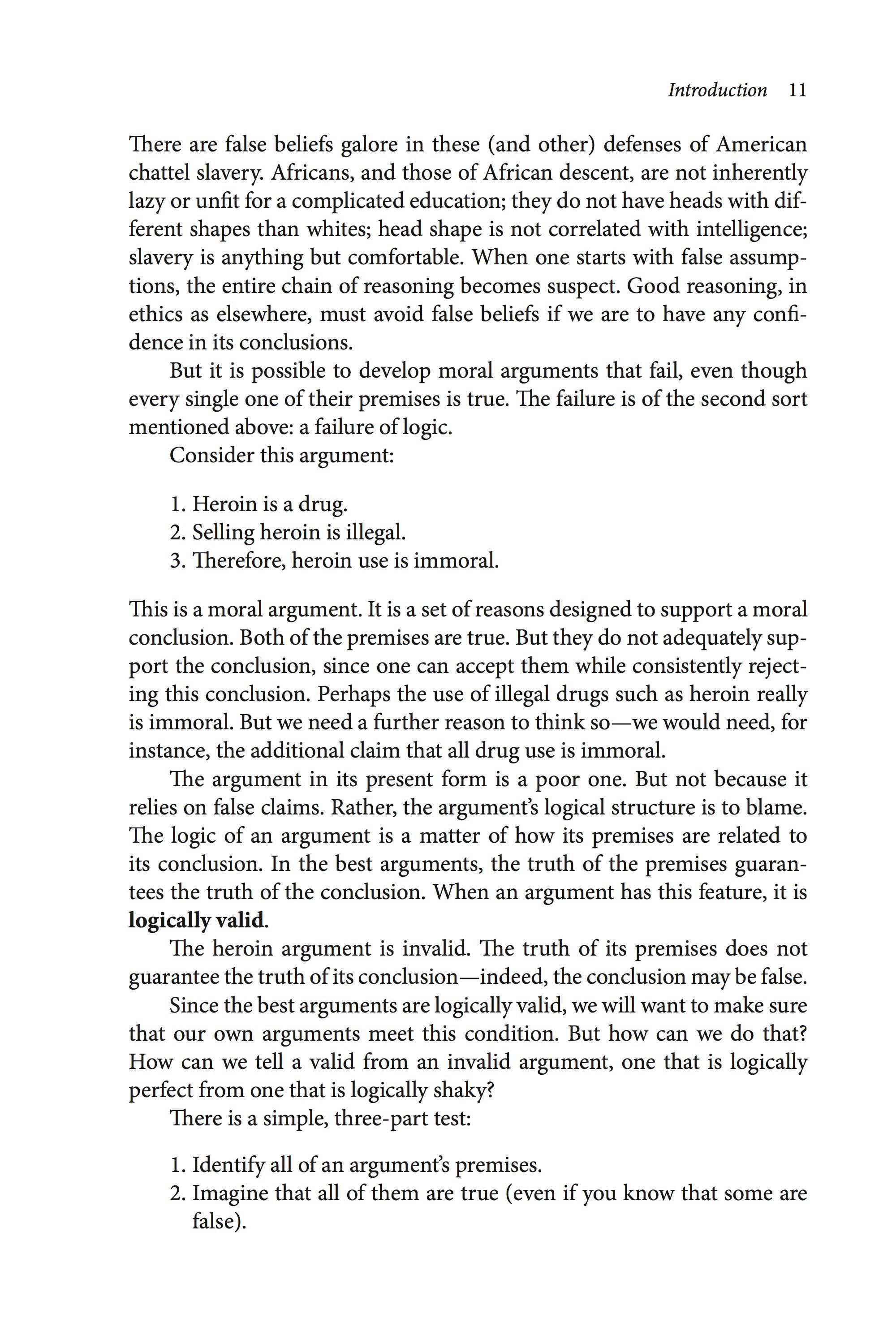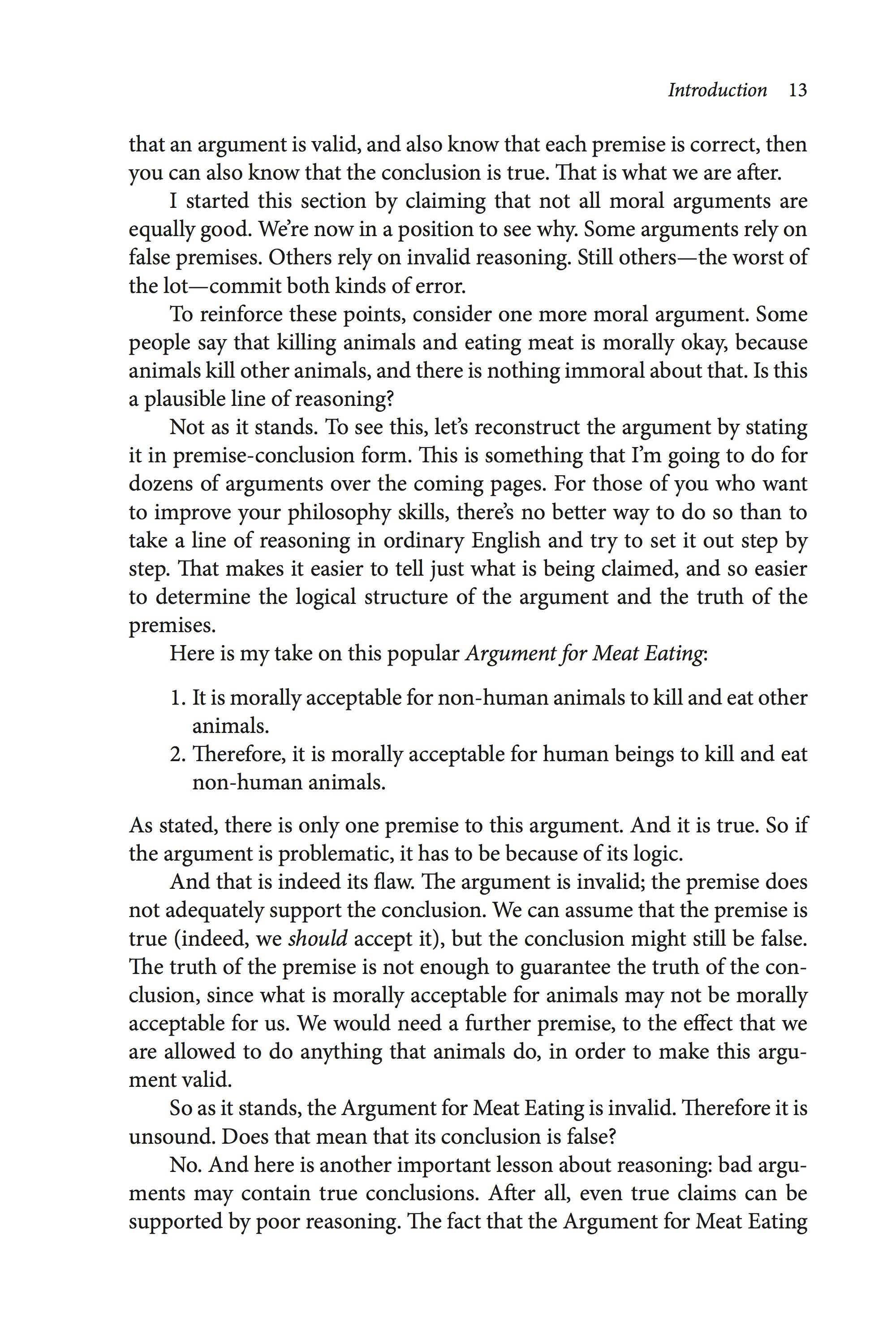(Original PDF) The Fundamentals of Ethics 4th
Visit to download the full and correct content document: https://ebookmass.com/product/original-pdf-the-fundamentals-of-ethics-4th/
More products digital (pdf, epub, mobi) instant download maybe you interests ...
Fundamentals of Athletic Training 4th Edition, (Ebook PDF)
https://ebookmass.com/product/fundamentals-of-athletictraining-4th-edition-ebook-pdf/
Fundamentals of Aerospace Medicine 4th Edition, (Ebook PDF)
https://ebookmass.com/product/fundamentals-of-aerospacemedicine-4th-edition-ebook-pdf/
(eTextbook PDF) for Fundamentals of Corporate Finance 4th by Jonathan Berk
https://ebookmass.com/product/etextbook-pdf-for-fundamentals-ofcorporate-finance-4th-by-jonathan-berk/
Organizational Ethics: A Practical Approach 4th Edition, (Ebook PDF)
https://ebookmass.com/product/organizational-ethics-a-practicalapproach-4th-edition-ebook-pdf/
Fundamentals of Athletic Training 4th Edition
https://ebookmass.com/product/fundamentals-of-athletictraining-4th-edition/
Fundamentals of Research in Criminology and Criminal Justice 4th Edition, (Ebook PDF)
https://ebookmass.com/product/fundamentals-of-research-incriminology-and-criminal-justice-4th-edition-ebook-pdf/
Fundamentals of Phonetics: A Practical Guide for Students 4th Edition, (Ebook PDF)
https://ebookmass.com/product/fundamentals-of-phonetics-apractical-guide-for-students-4th-edition-ebook-pdf/
Criminal Justice Ethics: Theory and Practice 4th Edition, (Ebook PDF)
https://ebookmass.com/product/criminal-justice-ethics-theory-andpractice-4th-edition-ebook-pdf/
Trapped: Brides of the Kindred Book 29 Faith Anderson
https://ebookmass.com/product/trapped-brides-of-the-kindredbook-29-faith-anderson/
CONTENTS
Preface xv
New to the Fourth Edition xvi
Instructor's Manual and Companion Website
A Note on the Companion Volume xvii
Acknowledgments xviii
INTRODUCTION 1
The Lay of the Land 1
Skepticism about Ethics 3
Ethical Starting Points 5
What Is Morality? 7
Moral Reasoning 9
The Role of Moral Theory 16 Looking Ahead 17
CHAPTER 1 Hedonism: Its Powerful Appeal 23
Happiness and Intrinsic Value 23
The Attractions of Hedonism 25
There Are Many Models of a Good Life 26
Personal Authority and Well-Being 27
Misery Clearly Hampers a Good Life; Happiness Clearly Improves It 27
Ihe Limits of Explanation 28
Rules of the Good Life and Their Exceptions 28
Happiness Is What We Want for Our Loved Ones 29
CHAPTER 2 Is Happiness All that Matters? 32
The Paradox of Hedonism 32
Evil Pleasures 34
The Two Worlds 35
False Happiness 36
The Importance of Autonomy 3 7
Life's Trajectory 40
Unhappiness as a Symptom of Harm 41
Conclusion 42
CHAPTER 3 Getting What You Want 44
A Variety of Good Lives 45
Personal Authority 45
Avoiding Objective Values 46
Motivation 4 7
Justifying the Pursuit of Self- Interest 48
Knowledge of the Good 49
CHAPTER 4 Problems for the Desire eory s1
Getting What You Want May Not Be Necessary for Promoting Your Good 51
Getting What You Want May Not Be Sufficient for Promoting Your Good 52
Desires Based on False Beliefs 52
Disinterested and Other-Regarding Desires 53
Disappointment 54
Ignorance of Desire Satisfaction 55
Impoverished Desires 55
Ihe Paradox of Self- Harm and Self-Sacrifice 56
Ihe Fallibility of Our Deepest Desires 57
Conclusion 58
PART TWO
CHAPTER 5 Morality and Religion 63
Three Assumptions about Morality and Religion 63
First Assumption: Religious Belief Is Needed for Moral Motivation 64
Second Assumption: God Is the Creator of Morality 66
Third Assumption: Religion Is an Essential Source of Moral Guidance 71
Conclusion 74
CHAPTER 6 Natural Law 76
The Theory and Its Attractions 76
Three Conceptions of Human Nature 80
Human Nature as Animal Nature 80
Human Nature Is What Is Innate 81
Human Nature Is What All Humans Have in Common 82
Natural Purposes 83
The Argument from Humanity 87
Conclusion 89
CHAPTER 7 Psychological Egoism 91
Egoism and Altruism 91
Does It Matter Whether Psychological Egoism Is True? 95
The Argument from Our Strongest Desires 95
The Argument from Expected Benefit 98
Two Egoistic Strategies 100
Appealing to the Guilty Conscience 100
Expanding the Realm of Self-Interest 100
Letting the Evidence Decide 101
Conclusion 105
CHAPTERs Ethical Egoism 107
Why Be Moral? 107
Two Popular Arguments for Ethical Egoism 110
The Self-Reliance Argument 111
The Libertarian Argument 112
The Best Argument for Ethical Egoism 113
Three Problems for Ethical Egoism 115
Egoism Violates Core Moral Beliefs 115
Egoism Cannot Allow for the Existence of Moral Rights 115
Egoism Arbitrarily Makes My Interests All-Important 117
Conclusion 118
CHAPTER 9 Consequentialism: Its Nature and Attractions 120
The Nature of Consequentialism 122
Structure 122
Maximizing Goodness 123
Moral Knowledge 124
Actual Versus Expected Results 125
Assessing Actions and Intentions 126
The Attractions of Utilitarianism 127
Impartiality 127
The Ability to Justify Conventional Moral Wisdom 128
Conflict Resolution 129
Moral Flexibility 130
The Scope of the Moral Community 131
Slippery Slope Arguments 135
CHAPTER 10 Consequentialism: Its Difficulties 139
Measuring Well-Being 139
Utilitarianism Is Very Demanding 143
Deliberation 143
Motivation 144
Action 145
Impartiality 147
No Intrinsic Wrongness (or Rightness) 149
The Problem of Injustice 151
Potential Solutions to the Problem of Injustice 152
Justice Is Also Intrinsically Valuable 153
Injustice Is Never Optimific 154
Justice Must Sometimes Be Sacrificed 154
Rule Consequentialism 155
Conclusion 158
CHAPTER 11 e Kantian Perspective: Fairness and ustice 160
Consistency and Fairness 161
The Principle ofUniversalizability 163
Morality and Rationality 166
Assessing the Principle of Universalizability 170
Integrity 171
Kant on Absolute Moral Duties 172
CHAPTER 12 e Kantian Perspective: Autonomy and Respect 175
The Principle of Humanity 176
The Importance of Rationality and Autonomy 178
The Good Will and Moral Worth 180
Five Problems with the Principle of Humanity 183
Vagueness 183
Determining Just Deserts 184 Are We Autonomous? 186
Moral Luck 188
The Scope of the Moral Community 189
Conclusion 191
CHAPTER13 e Social Contract Tradition: and Its Attractions 194
The Lure of Proceduralism 194
The Background of the Social Contract Theory 195
The Prisoner's Dilemma 196
Cooperation and the State of Nature 199
The Advantages of Contractarianism 200 e
Morality Is Essentially a Social Phenomenon 200
Contractarianism Explains and Justifies the Content of the Basic Moral Rules 201
Contractarianism Offers a Method for Justifying
Every Moral Rule 202
Contractarianism Explains the Objectivity of Morality 202
Contractarianism Explains Why It Is Sometimes Acceptable to Break the Moral Rules 203
eory
More Advantages: Morality and the Law 204
Contractarianism Justifies a Basic Moral Duty to Obey the Law 204
The Contractarian Justification of Legal Punishment 204
Contractarianism Justifies the State's Role in Criminal Law 205
Contractarianism and Civil Disobedience 205
CHAPTER 14 e Social Contract Tradition: Problems and Prospects 2os
Why Be Moral? 208
The Role of Consent 212
Disagreement among the Contractors 215
The Scope of the Moral Community 216
Conclusion 219
CHAPTER 15 Ethical Pluralism and Absolute Moral Rules 221
The Structure of Moral Theories 221
Is Torture Always Immoral? 222
Preventing Catastrophes 224
The Doctrine of Double Effect 225
A Reply to the Argument from Disaster Prevention 227
How the DDE Threatens Act Consequentialism 227
Distinguishing Intention from Foresight 228
Moral Conflict and Contradiction 230
Is Moral Absolutism Irrational? 231
The Doctrine of Doing and Allowing 233
Conclusion 237
CHAPTER 16 Ethical Pluralism: Prima Facie Duties and Ethical Particularism 239
Ross's Ethic of Prima Facie Duties 239
The Advantages of Ross's View 241
Pluralism 241
We Are Sometimes Permitted to Break the Moral Rules 241
Moral Conflict 241
Moral Regret 242
Addressing the Anti-absolutist Arguments 243
A Problem for Ross's View 244
Knowing the Fundamental Moral Rules 245
Self- Evidence and the Testing of Moral Theories 246
Knowing the Right Thing to Do 247
Ethical Particularism 249
Three Problems for Ethical Particularism 251
Its Lack of Unity 251
Accounting for Moral Knowledge 252
Some Things Possess Permanent Moral Importance 252
Conclusion 254
CHAPTER 17 Virtue Ethics 256
The Standard of Right Action 257
Moral Complexity 258
Moral Understanding 259
Moral Education 261
The Nature of Virtue 262
Virtue and the Good Life 264
Objections 266
Tragic Dilemmas 266
Does Virtue Ethics Offer Adequate Moral Guidance? 267
Is Virtue Ethics Too Demanding? 269
Who Are the Moral Role Models? 270
Conflict and Contradiction 271
The Priority Problem 272
Conclusion 274
CHAPTER 18 Fetninist Ethics 276
The Elements of Feminist Ethics 276
Moral Development 278
Women's Experience 279
The Ethics of Care 282
The Importance of Emotions 283 Against Unification 284 Against Impartiality and Abstraction 285 Against Competition 285
Downplaying Rights 286
Challenges for Feminist Ethics 287
Conclusion 289
PART THREE
Metaethics: e Status of Morality
CHAPTER 19 Ethical Relativistn 293
Moral Skepticism 293
Two Kinds of Ethical Relativism 295
Some Implications of Ethical Subjectivism and Cultural Relativism 296
Moral Infallibility 296
Moral Equivalence 298
Questioning Our Own Commitments 299
Moral Progress 299
Ethical Subjectivism and the Problem of Contradiction 300
Cultural Relativism and the Problem of Contradiction 302
Ideal Observers 305
Conclusion 309
CHAPTER 20 Moral Nihilistn 310
Error Theory 311
Expressivism 316
How Is It Possible to Argue Logically about Morality? 318
Expressivism and Amoralists 319
Ihe Nature of Moral Judgment 320
Conclusion 321
CHAPTER 21 Eleven Arguments Against Moral Objectivity 323
1. Objectivity Requires Absolutism 324
2. All Truth Is Subjective 325
3. Equal Rights Imply Equal Plausibility 326
4. Moral Objectivity Supports Dogmatism 327
5. Moral Objectivity Supports Intolerance 328
6. Moral Objectivity Cannot Allow for Legitimate Cultural Variation 330
7. Moral Disagreement Undermines Moral Objectivity 331
8. Atheism Undermines Moral Objectivity 333
9. The Absence of Categorical Reasons Undermines Moral Objectivity 334
10. Moral Motivation Undermines Moral Objectivity 336
11. Values Have No Place in a Scientific World 338
Conclusion 341
References R l
Suggestions for Further Reading FR-1
<Jlossary CJ l
Index J ... l
PREFACE
his book is divided into three parts one on the Good Life, another on Doing the Right Thing, and the last on the Status of Morality. You can read these parts in any order. Many will want to begin at the end, for instance, with a discussion of whether morality is a human invention, or is in some way objective. Some will prefer to start in the middle, asking about the supreme principle of morality (and whether there is any such thing). And others may want to begin at the beginning, by thinking about human well-being and the quality of life. Each part can be understood independently of the others, though there are of course many points of connection across the three main branches of moral philosophy. No matter where you begin, there are footnotes in most chapters that provide cross-references to relevant discussions elsewhere in the book.
When beginning a new area of study, you're bound to encounter some unfamiliar jargon. I've tried to keep this to a minimum, and I suppose that you can be thankful that we're doing ethics here, rather than physics or anatomy. I define each technical term when I first use it, and have also put together a glossary, which appears at the end of the book. Each specialized term that appears in boldface has an entry there.
You may be interested enough in what you read here that you'll want to continue your studies in moral philosophy. There is a natural place to begin the companion volume to this book, The Ethical Life, described later in this preface. I have also compiled a list of Suggestions for Further Reading for each chapter or pair of chapters. This list appears at the end of
the book, just before the Glossary. I have selected the readings with an eye to what might be accessible and interesting to those just beginning their study of moral philosophy.
There is so much that is fascinating about ethics. This tempts a textbook author to go on and on. And yet page limits must be respected. Deciding what to keep and what to leave on the editing floor has been a real challenge. Perhaps you think that the balance hasn't always been well struck. Perhaps you find certain discussions unclear or boring. Io like to know about this. The best way to get in touch is by email: RussShafer Landau@gmail.com.
New to the Fourth Edition
I'm very pleased that students and instructors have found this book useful enough to warrant a new edition. In the interests of maintaining continuity with the previous edition, I have tried to introduce only relatively modest changes. While I have made many dozens of small changes in the hopes of improving clarity and accuracy, I have also introduced several larger revisions. Here is a brief list:
• Chapters 3 and 4 now include discussions that reflect clearer distinctions between the intrinsic and instrumental values of desire satisfaction.
• Chapter 7 includes a new discussion of the empirical literature on altruism.
• Chapter 19 includes a new discussion of the attractions of ethical subjectivism and relativism.
• Substantive improvements have also been made to many sections, including:
• Happiness and Intrinsic Value in chapter 1
• The Paradox of Hedonism in chapter 2
• Two Popular Arguments for Ethical Egoism in chapter 8
• The Structure of Consequentialism in chapter 9
• Slippery Slope Arguments in chapter 9
• Measuring Well-Being in chapter 10
• Ideal Observers in chapter 19
• The comprehensive companion website associated with this book has been updated, as has its Instructor's Manual. These resources
contain loads of helpful material so much so that they deserve a brief summary all their own.
Instructor's Manual and Companion Website
The website designed to support this book offers about 250 multiple-choice questions for students to test their comprehension of the materials here. It also contains a glossary and links to other websites of further interest. You can visit the companion website at www.oup.com/us/shafer-landau.
In addition, the Instructor's Manual can be accessed on the Oxford University Press Ancillary Resource Center (ARC) at https://arc2.oup-arc .com/access/ shafer-landau- fundamentals-of-ethics-4e- instructor- resources. The manual itself has summaries for all twenty-one chapters, more than 100 essay questions, over 200 multiple-choice questions (in addition to those available elsewhere on the website), about 200 PowerPoint slides to help organize lectures, and a variety of links that point students to web sites with content that supplements the material in this book. The ARC is a convenient, instructor-focused, single destination for resources to accompany this text. Accessed online through individual user accounts, the ARC provides instructors with up-to-date ancillaries at any time while guaranteeing the security of grade-significant resources. In addition, it allows Oxford University Press to keep instructors informed when new content becomes available.
The work for these ancillary materials was undertaken by my stellar research assistants: Justin Horn, who provided all of the Web materials associated with the first two editions, and Ben Schwan, who provided updates associated with the third and this latest edition. I am very grateful for their dedicated efforts in making these first-rate resources.
A Note on the Companion Volume
There are two kinds of introductory books. One is the sort that you have in your hands right now. It's one person's take on the subject, and your fate, dear reader, depends on how reliable and engaging that author happens to be. I have tried to be both, but you will be the judge of that. There are benefits to a single-authored book. At its best, you'll get a coherent narrative that draws connections between various discussions. You'll be handed the important highlights, be introduced to the really big ideas, and get an accurate map of the relevant terrain.
But there is another approach, equally valid. And that is to hear what the major figures in the area have to say, to familiarize yourself with the original voices in the field. For those with an interest in going this route, I have put together a companion volume, The Ethical Life: Fundamental Readings in Ethics and Moral Problems, which allows you to do just that.
The Ethical Life gathers together readings from more than forty authors on the main subjects that are covered here. There are many entries on the good life, on the central ethical theories, and on the status of morality. There are also twenty additional readings on pressing moral problems, such as the death penalty, abortion, animal rights, and other urgent matters. There are many resources that can help readers through that book introductions to each reading, study questions, suggestions for further reading, and a website with sample quizzes, essay questions, and lots of extra materials.
The fullest introduction to ethics would include both of these approaches. The Ethical Life will give you lots of primary sources, and Fundamentals can help you to place them in context, clearly setting out their ideas and providing some critical evaluation of their strengths and weaknesses. For those who are content to take my word for it, Fundamentals will be enough. For those who want to see what other philosophers have to say about these important matters, The Ethical Life might be a good place to start. And for those of you attracted by both approaches, working through each in tandem with the other can provide a well-rounded picture of what moral philosophy is all about.
Acknowledgments
I wrote this book because my editor, Robert Miller, asked me to. Well, not really. He asked, and I refused. He did it again, and I refused. Obviously, I did finally give in. I want to thank Robert for his persistence, but much more importantly for his unflagging enthusiasm and his uncommon good sense. His assistant Alyssa Palazzo has been a dream to work with.
One of Robert's many kindnesses was to solicit feedback from so many talented philosophers. I hope that the following folks will accept my gratitude for having provided very helpful comments on drafts and previous editions of this book: Paul Abela, Luke Amentas, Martin Andersson, Kristopher Area, Thomas Avery, Ralph Baergen, Stacy Bautista, Jeffrey Brand-Ballard, Don Carrell, Tom Carson, Michael Cholbi, David Detmer, Josh DiPaolo, Howard M. Ducharme, Matthew Eshleman, Daan Evers,
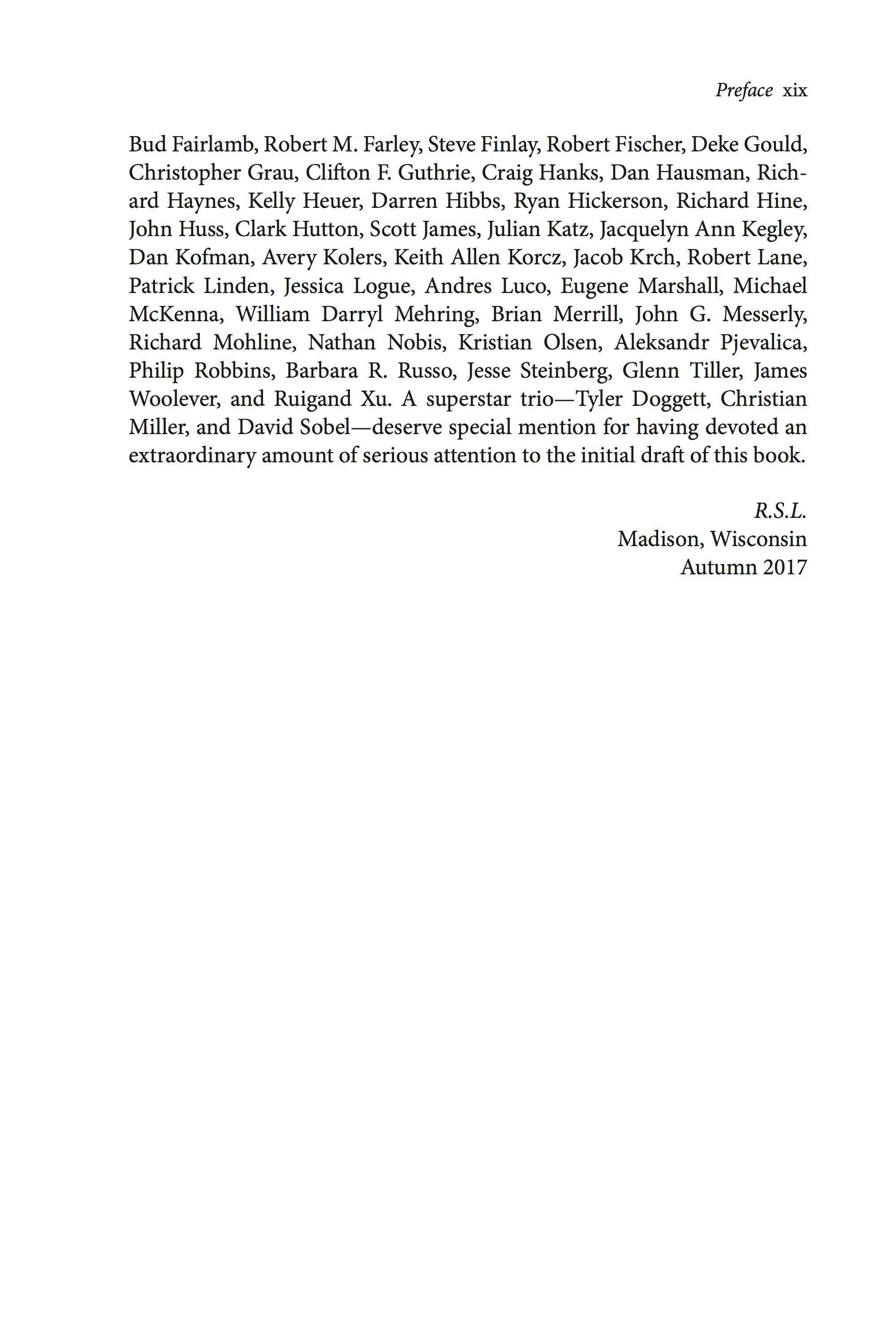
Bud Fairlamb, Robert M. Farley, Steve Finlay, Robert Fischer, Deke Gould, Christopher Grau, Clifton F. Guthrie, Craig Hanks, Dan Hausman, Richard Haynes, Kelly Heuer, Darren Hibbs, Ryan Hickerson, Richard Hine, John Huss, Clark Hutton, Scott James, Julian Katz, Jacquelyn Ann Kegley, Dan Kofman, Avery Kolers, Keith Allen Karcz, Jacob Krch, Robert Lane, Patrick Linden, Jessica Logue, Andres Luco, Eugene Marshall, Michael McKenna, William Darryl Mehring, Brian Merrill, John G. Messerly, Richard Mohline, Nathan Nobis, Kristian Olsen, Aleksandr Pjevalica, Philip Robbins, Barbara R. Russo, Jesse Steinberg, Glenn Tiller, James Woolever, and Ruigand Xu. A superstar trio Tyler Doggett, Christian Miller, and David Sobel deserve special mention for having devoted an extraordinary amount of serious attention to the initial draft of this book.
R.S.L. Madison, Wisconsin Autumn 2017
INTRODUCTION
The Lay of the Land
There is so much to know about our world. And for those who are the least bit curious, we have more resources than ever to give us the insights we seek. We can turn to a variety of scientists, doctors, economists, historians, and journalists to help us better understand ourselves, our world, and our place within it.
But there is a set of vital questions that such experts will never answer. These are questions about how we ought to live. Sure, financial advisors can tell us how we ought to invest our money. Personal trainers can advise us on getting in shape. Career counselors can steer us in one direction or another. But if we are interested instead in what our guiding ideals should be, in what sort of life is worth living, in how we should treat one another, then we must turn to philosophy. Ethics also known as moral philosophy is the branch of knowledge concerned with answering such questions.
The field of ethics is vast, and bad news first there is no chance of covering all of its interesting and important issues within these pages. In selecting the topics for treatment, I have chosen those that seem to me most central. These can be grouped under three headings, each representing a core area of moral philosophy:
1. Value theory 1 : What is the good life? What is worth pursuing for its own sake? How do we improve our lot in life?
2. Normative ethics: What are our fundamental moral duties? Which character traits count as virtues, which as vices, and why? Who should our role models be? Do the ends always justify the means, or are there certain types of action that should never be done under any circumstances?
3. Metaethics: What is the status of moral claims and advice? Can ethical theories, moral principles, or specific moral verdicts be true? If so, what makes them true? Can we gain moral wisdom? If so, how? Do we always have good reason to do our moral duty?
The structure of this book mirrors this threefold division. The first part is focused on the good life, with an emphasis on explaining the nature and sources of well-being. We ask, for instance, about whether happiness is the he-all and end-all of a good life, the only thing desirable for its own sake. And, naturally, we'll consider views that deny this, including, most importantly, the theory that tells us that getting what we want whatever we want is the key to the good life.
Then it's off to normative ethics, which is devoted to examining our moral relations with one another. Who counts are animals, ecosystems, or fetuses morally important in their own right? Is there a fundamental moral rule, such as the golden rule, that can justify all of our specific moral duties? What role do virtue, self-interest, and justice play in morality? Are we ever allowed to break the moral rules? If so, when and why? These are among the most important questions taken up in normative ethics.
Finally, to metaethics. This part of moral philosophy asks questions about the other two. Specifically, it asks about the status of ethical claims, rather than about their content. We all have views about what is right and good. Are these just matters of taste? Is moral authority based on personal approval? Social customs? God's commands? Or none of the above? Is morality in more or less good working order, or is it just a convenient fiction that keeps us in our place? These are the questions that we will take up in the last section of the book.
1. All technical terms and phrases that appear in boldface are defined in the Glossary at the end of the book.
There is no shortage of folks offering advice about these questions. The self- help industry has its gurus, motivational speakers, and best sellers, each aimed at guiding us on the path to a good life. Political pundits, religious leaders, and editorial writers are more than happy to offer us their blueprints for righteous living. They don't always agree, of course. It would be nice to have a way to sort out the decent advice from the rest.
Those of you turning to philosophical ethics for the first time are likely to be hoping for something that I can't provide, namely, a simple recipe for doing the sorting. It is perfectly natural to want a clear method for dis tinguishing correct from incorrect answers about the good life and our moral duty. Indeed, when I first went to college, I enrolled in a philosophy course hoping for just such a thing. My failure to find it left me deeply disappointed. I abandoned philosophy for a few years, and even dropped out of college for a while. After I returned, I went looking for it again. I've finally realized that in this area of life, while there is plenty of good advice, it can't be summed up in one snappy formula, captured in a neat slogan that can be inscribed in a fortune cookie or on a bumper sticker.
Ethics is hard. It needn't be weakness or fuzzy thinking that stands in the way of knowing the right thing to do, or the proper goals to strive for. We are right to be puzzled by the moral complexity we find in our lives. While we might yearn for clarity and simplicity, this wish for easy answers is bound to be repeatedly frustrated.
Skepticism about Ethics
When people learn of the difficulties that face each important attempt to solve ethical puzzles, they often give in to skepticism. The major temptation is to regard the entire enterprise as bankrupt, or to think that all ethical views are equally plausible.
Doubts about morality are plentiful, and it would be silly to ignore them in a book that is so focused on trying to improve our moral understanding. Chapters 19, 20, and 21 are entirely devoted to such doubts; those who feel them acutely might do best to start with those chapters, and then work their way to the other parts of the book that are focused on the good life and normative ethics.
For now, let me say just a few things to the doubters. Perhaps the most important is this: among those who have thought longest and hardest about ethics, the view that morality is all make-believe, or that all moral
standards are correct only relative to individuals or societies, is deeply controversial. There are lots of problems with such views. Some of these problems may be devastating.
As a result, it would be a serious mistake just to assume that morality is a fiction, or that personal or cultural opinion is the ultimate measure of what is right and wrong. We must follow the arguments where they lead. They may indeed lead us ultimately to embrace such positions. But they might not. And we can't know one way or the other until we've actually done the hard work.
Since I really love this part of ethics the metaethical part I can't resist saying just a bit more here. In my experience, most of those who harbor serious doubts about morality base their skepticism on one or more of the following considerations:
(A) Individuals constantly disagree about what's right and wrong, and societies do, too. If there were some objective truth in ethics, then we should expect all really smart people to agree on it. They don't. So there is no objective truth in ethics.
(B) There are universally correct moral standards only if God exists. But God doesn't exist, so ethics is just a ((human construct:'
(C) Science tells us the truth about the world, and science says nothing about what's right and wrong. And that's because nothing really is right or wrong.
(D) If there were a universal ethic, then that would make it okay for some people to impose their own views on others. But that's not okay at all. Therefore there is no universal ethic.
(E) If there were objective moral rules, then it would always be wrong to break them. But every rule admits of exceptions; no moral rule is absolute. That shows that we do make up the moral rules after all.
This is going to sound like cheating, but here goes: every single one of these arguments is problematic. I'm not going to defend that claim right now that's what the last three chapters of this book are for. So I don't expect you to believe me (yet). Still, there is a lesson here: until these (or other) arguments are laid out with care and successfully defended, we are in no position to assume that the skeptics about morality are right.
I think you'll soon see that we can make a lot of progress in our moral thinking. And even if morality is in some way a human invention, there is still lots to learn, and there are many ways to make mistakes when
thinking about what is good and right. It's important to avoid these errors. Doing moral philosophy can help with this.
Look at it this way. Lots of people believe that when it comes to art, beauty is in the eye of the beholder there are no objective, universal standards of good taste. Suppose that's true. And suppose that morality is just like art in this respect. Still, our tastes can be educated and improved. Many people are much wiser than I am about music and painting, for instance. Even if there are no universal standards of good taste, it would be silly of me to pass up a chance to talk with people who have thought long and hard about artistic matters. Why should I dismiss their opinions and refuse to hear them out? I'm no genius. Maybe I could learn a thing or two.
That's exactly the right attitude to take about ethics. Especially when so much is at stake the very quality of our life and our relations with others it would be terrible to close our minds to new and challenging ideas. Those who have thought so hard about the central questions of existence may well have something to teach us.
I encourage you to resist the diagnosis that in ethics, anything goes. As you'll see, good moral thinking is disciplined thinking. There are many ways that we can go wrong in our moral reflections, and failure here can have the most disastrous results. Though it is sometimes hard to know when we have got it right in ethics, it is often very easy to know when we (or others) have made a mistake. There are clear cases of people ruining their lives, or doing morally horrific things. We should keep that in mind before siding too quickly with a skepticism that says that every moral view is as good as every other.
Ethical Starting Points
One of the puzzles about moral thinking is knowing where to begin. Some skeptics about morality deny that there are any proper starting points for ethical reflection. They believe that moral reasoning is simply a way of rationalizing our biases and gut feelings. This outlook encourages us to be lax in moral argument and, worse, supports an attitude that no moral views are any better than others. While this sort of skepticism might be true, we shouldn't regard it as the default view of ethics. We should accept it only as a last resort.
In the meantime, let's consider some fairly plausible ethical assumptions, claims that can get us started in our moral thinking. The point of the
exercise is to soften you up to the idea that we are not just spinning our wheels when thinking morally. There are reasonable constraints that can guide us when thinking about how to live. Here are some of them:
• Neither the law nor tradition is immune from moral criticism. The law does not have the final word on what is right and wrong. Neither does tradition. Actions that are legal, or customary, are sometimes morally mistaken.
• Everyone is morally fallible. Everyone has some mistaken ethical views, and no human being is wholly wise when it comes to moral matters.
• Friendship is valuable. Having friends is a good thing. Friendships add value to your life. You are better off when there are people you care deeply about, and who care deeply about you.
• We are not obligated to do the impossible. Morality can demand only so much of us. Moral standards that are impossible to meet are illegitimate. Morality must respect our limitations.
• Children bear less moral responsibility than adults. Moral responsibility assumes an ability on our part to understand options, to make decisions in an informed way, and to let our decisions guide our behavior. The fewer of these abilities you have, the less blameworthy you are for any harm you might cause.
• Justice is a very important moral good. Any moral theory that treats justice as irrelevant is deeply suspect. It is important that we get what we deserve, and that we are treated fairly.
• Deliberately hurting other people requires justification. The default position in ethics is this: do no harm. It is sometimes morally acceptable to harm others, but there must be an excellent reason for doing so or else the harmful behavior is unjustified.
• Equals ought to be treated equally. People who are alike in all relevant respects should get similar treatment. When this fails to happenwhen racist or sexist policies are enacted, for instance then something has gone wrong.
• Self-interest isn't the only ethical consideration. How well-off we are is important. But it isn't the only thing of moral importance. Morality sometimes calls on us to set aside our own interests for the sake of others.
• Agony is bad. Excruciating physical or emotional pain is bad. It may sometimes be appropriate to cause such extreme suffering, but doing so requires a very powerful justification.
• Might doesn't make right. People in power can get away with lots of things that the rest of us can't. That doesn't justify what they do. That a person can escape punishment is one thing whether his actions are morally acceptable is another.
• Free and informed requests prevent rights violations. If, with eyes wide open and no one twisting your arm, you ask someone to do something for you, and she does it, then your rights have not been violated even if you end up hurt as a result.
There are a number of points to make about these claims.
First, this short list isn't meant to be exhaustive. It could be made much longer.
Second, I am not claiming that the items on this list are beyond criticism. I am saying only that each one is very plausible. Hard thinking might weaken our confidence in some cases. The point, though, is that without such scrutiny, it is perfectly reasonable to begin our moral thinking with the items on this list.
Third, many of these claims require interpretation in order to apply them in a satisfying way. When we say, for instance, that equals ought to be treated equally, we leave all of the interesting questions open. (What makes people equals? Can we treat people equally without treating them in precisely the same way? Etc.)
Not only do we have a variety of plausible starting points for our ethical investigations; we also have a number of obviously poor beginnings for moral thinking. A morality that celebrates genocide, torture, treachery, sadism, hostility, and slavery is, depending on how you look at it, either no morality at all or a deeply failed one. Any morality worth the name will place some importance on justice, fairness, kindness, and reasonableness. Just how much importance, and just how to balance things in cases of conflict that is where the real philosophy gets done.
at Is Morality:
Before investing yourself too heavily in a subject matter, it would be nice to first have some idea of what you are getting yourself into. One waysometimes the best to gain such an understanding is by considering a definition. When you open your trigonometry text or chemistry handbook, you'll likely be given, very early on, a definition of the area you are about to intensively study. So, as a responsible author, I would seem to have a duty now to present you with a definition of morality.
I'd certainly like to. But I can't. There is no widely agreed-on definition of morality. We know that it is centrally concerned with protecting people's well-being, with fairness, justice, respect for others, virtue, responsibility, rights, liberties, social cooperation, praise, and blame. But the precise nature of such concern is highly disputed, as we'll soon see.
The absence of a definition does not leave us entirely in the dark. (After all, no one has yet been able to offer informative definitions of literature, or life, or art, and yet we know a great deal about those things.) We can get a sense of our subject matter by considering the questions that are distinctive of ethics namely, those that structure this book, the ones focused on the good life, our duties to others, the nature of virtue, etc. We can supplement this by considering the starting points listed above, and many others that we could easily identify.
We can also better understand morality by contrasting its principles with those that govern the law, etiquette, self-interest, and tradition. Each of these represents a set of standards for how we ought to behave, ideals to aim for, rules that we should not break. But the fact that a law tells us to do something does not settle the question of whether morality gives its stamp of approval. Some immoral acts (like cheating on a spouse) are not illegal. And some illegal acts (like voicing criticism of a dictator) are not immoral. Certainly, many laws require what morality requires, and forbid what morality forbids. But the fit is hardly perfect, and that shows that morality is something different from the law. That a legislature passed a bill is not enough to show that the bill is morally acceptable.
We see the same imperfect fit when it comes to standards of etiquette. Forks are supposed to be set to the left of a plate, but it isn't immoral to set them on the right. Good manners are not the same thing as morally good conduct. Morality sometimes requires us not to be polite or gracious, as when someone threatens your children or happily tells you a racist joke. So the standards of etiquette can depart from those of morality.
The same is true when it comes to the standards of self-interest. I've just been watching the entire run of The Shield, a police drama set in a crime-ridden district of Los Angeles. Early in the series, the main character, Vic Mackey, murders a fellow police officer who was set to reveal Mackey's corruption. Mackey successfully frames a criminal for the murder: a classic case of protecting one's own interests by acting immorally. Though the relation between self-interest and morality is contested, it is a plausible starting point to assume that morality can sometimes require us to sacrifice our well-being, and that we can sometimes improve our lot
in life by acting unethically. So the standards of morality are not the very same as those of self-interest. (We will see a challenge to this view when considering ethical egoism in chapter 8.)
Finally, morality is also distinct from tradition. That a practice has been around a long time does not automatically make it moral. Morality sometimes requires a break with the past, as it did when people called for the abolition of slavery or for allowing women to vote.
True, people do sometimes speak of conventional morality, which is the set of traditional principles that are widely shared within a culture or society. These principles, like those of the law and etiquette, are the result of human decisions, agreements and practices. Conventional morality can differ from society to society. At least some of its principles can be traced to common misunderstandings, irrationality, bias, or superstition.
When I write about morality in this book, I am not referring to conventional morality. I am assuming that some social standards even those that are long-standing and very popular can be morally mistaken. (We'll examine this assumption at length in chapter 19.) So when I talk about morality from this point on, I will be referring to moral standards that are not rooted in widespread endorsement, but rather are independent of conventional morality and can be used to critically evaluate its merits.
It's possible, of course, that conventional morality is all there is. But this would be a very surprising discovery. Most of us assume, as I will do, that the popularity of a moral view is not a guarantee of its truth. We could be wrong on this point, but until we have a chance to consider the matter in detail, I think it best to assume that conventional morality can sometimes be mistaken. If so, then there may be some independent, ((critical" morality that (i) does not have its origin in social agreements, (ii) is untainted by mistaken beliefs, irrationality, or popular prejudices, and (iii) can serve as the true standard for determining when conventional morality has got it right and when it has fallen into error. That is the morality whose nature we are going to explore in this book.
Moral Reasoning
Moral reasoning, like all reasoning, involves at least two things: a set of reasons, and a conclusion that these reasons are meant to support. When you put these two things together, you have what philosophers call an argument. This isn't a matter of bickering or angrily exchanging words.
An argument is simply any chain of thought in which reasons (philosophers call these premises) are offered in support of a particular conclusion. Not all arguments are equally good. This is as true in ethics as it is in science, mathematics, or politics. It is easy to mistake one's way when it comes to ethical thinking. We can land at the wrong conclusion (by endorsing child abuse, for instance). We can also arrive at the right conclusion by means of terrible reasoning. We must do our best to avoid both of these mistakes.
In other words, our moral thinking should have two complementary goals: getting it right, and being able to back up our views with flawless reasoning. We want the truth, both in the starting assumptions we bring to an issue and in the conclusions we eventually arrive at. But we also want to make sure that our views are supported by excellent reasons. And this provides two tests for good moral reasoning: first, we must avoid false beliefs, and second, the logic of our moral thinking must be rigorous and error- free.
The first test is pretty easy to understand. Consider the following quote, written in 1833, by the pro-slavery author Richard Colfax:
[T]he mind will be great in proportion to the size and figure of the brain: it is equally reasonable to suppose, that the acknowledged meanness of the negroe's intellect, only coincides with the shape of his head; or in other words, that his want [i.e., lack] of capability to receive a complicated education renders it improper and impolitic, that he should be allowed the privileges of citizenship in an enlightened country. 2
And here is William John Grayson, antebellum congressman and senator from South Carolina, on the same subject:
Slavery is the negro system of labor. He is lazy and improvident. What more can be required of Slavery, in reference to the negro, than has been done? It has made him, from a savage, an orderly and efficient labourer. It supports him in comfort and peace. It restrains his vices. It improves his mind, morals and manners. 3
2. Richard H. Colfax, Evidence Against the Views of the Abolitionists, Consisting of Physical and Moral Proofs, of the Natural Inferiority of the Negroes (New York: James T. M. Bleakley, 1833), p. 25.
3. William John Grayson, The Hireling and the Slave (Charleston, S.C.: John Russell, 1855), p. vii.
There are false beliefs galore in these (and other) defenses of American chattel slavery. Africans, and those of African descent, are not inherently lazy or unfit for a complicated education; they do not have heads with different shapes than whites; head shape is not correlated with intelligence; slavery is anything but comfortable. When one starts with false assumptions, the entire chain of reasoning becomes suspect. Good reasoning, in ethics as elsewhere, must avoid false beliefs if we are to have any confidence in its conclusions.
But it is possible to develop moral arguments that fail, even though every single one of their premises is true. The failure is of the second sort mentioned above: a failure of logic.
Consider this argument:
1. Heroin is a drug.
2. Selling heroin is illegal.
3. Therefore, heroin use is immoral.
This is a moral argument. It is a set of reasons designed to support a moral conclusion. Both of the premises are true. But they do not adequately support the conclusion, since one can accept them while consistently rejecting this conclusion. Perhaps the use of illegal drugs such as heroin really is immoral. But we need a further reason to think so we would need, for instance, the additional claim that all drug use is immoral.
The argument in its present form is a poor one. But not because it relies on false claims. Rather, the argument's logical structure is to blame. The logic of an argument is a matter of how its premises are related to its conclusion. In the best arguments, the truth of the premises guarantees the truth of the conclusion. When an argument has this feature, it is logically valid.
The heroin argument is invalid. The truth of its premises does not guarantee the truth of its conclusion indeed, the conclusion may be false. Since the best arguments are logically valid, we will want to make sure that our own arguments meet this condition. But how can we do that? How can we tell a valid from an invalid argument, one that is logically perfect from one that is logically shaky?
There is a simple, three-part test:
1. Identify all of an argument's premises.
2. Imagine that all of them are true (even if you know that some are false).
3. Then ask yourself this question: Supposing that all of the premises were true, could the conclusion be false? If yes, the argument is invalid. The premises do not guarantee the conclusion. If no, the argument is valid. The premises offer perfect logical support for the conclusion.
Validity is a matter of how well an argument's premises support its conclusion. To test for this, we must assume that all of an argument's premises are true. We then ask whether the conclusion must therefore be true. If so, the argument is valid. If not, not.
Note that an argument's validity is a matter of the argument's structure. It has nothing to do with the actual truth or falsity of an argument's premises or conclusion. Indeed, valid arguments may contain false premises and false conclusions.
To help clarify the idea, consider the following argument. Suppose you are a bit shaky on your U.S. history, and I am trying to convince you that John Quincy Adams was the ninth president of the United States. I offer you the following line of reasoning:
1. John Quincy Adams was either the eighth or the ninth U.S. president.
2. John Quincy Adams was not the eighth U.S. president.
3. Therefore, John Quincy Adams was the ninth U.S. president.
In one way, this reasoning is impeccable. It is logically flawless. This is a valid argument. If all premises of this argument were true, then the conelusion would have to be true. It is impossible for 1 and 2 to be true and 3 to be false. It passes our test for logical validity with flying colors.
But the argument is still a bad one not because of any logical error, but because it has a false premise (number 1; Quincy Adams was the sixth U.S. president) and a false conclusion. The truth of an argument's premises is one thing; its logical status is another.
The lesson here is that truth isn't everything; neither is logic. We need them both. What we want in philosophy, as in all other areas of inquiry, are arguments that have two features: (1) they are logically watertight (valid), and (2) all of their premises are true. These arguments are known as sound arguments.
Sound arguments are the gold standard of good reasoning. And it's easy to see why. They are logically valid. So if all of their premises are true, their conclusion must be true as well. And by definition, sound arguments contain only true premises. So their conclusions are true. If you can tell
that an argument is valid, and also know that each premise is correct, then you can also know that the conclusion is true. That is what we are after.
I started this section by claiming that not all moral arguments are equally good. We're now in a position to see why. Some arguments rely on false premises. Others rely on invalid reasoning. Still others the worst of the lot commit both kinds of error.
To reinforce these points, consider one more moral argument. Some people say that killing animals and eating meat is morally okay, because animals kill other animals, and there is nothing immoral about that. Is this a plausible line of reasoning?
Not as it stands. To see this, let's reconstruct the argument by stating it in premise-conclusion form. This is something that I'm going to do for dozens of arguments over the coming pages. For those of you who want to improve your philosophy skills, there's no better way to do so than to take a line of reasoning in ordinary English and try to set it out step by step. That makes it easier to tell just what is being claimed, and so easier to determine the logical structure of the argument and the truth of the • premises.
Here is my take on this popular Argument for Meat Eating:
1. It is morally acceptable for non-human animals to kill and eat other animals.
2. Therefore, it is morally acceptable for human beings to kill and eat non-human animals.
As stated, there is only one premise to this argument. And it is true. So if the argument is problematic, it has to be because of its logic.
And that is indeed its flaw. The argument is invalid; the premise does not adequately support the conclusion. We can assume that the premise is true (indeed, we should accept it), but the conclusion might still be false. The truth of the premise is not enough to guarantee the truth of the conclusion, since what is morally acceptable for animals may not be morally acceptable for us. We would need a further premise, to the effect that we are allowed to do anything that animals do, in order to make this argument valid.
So as it stands, the Argument for Meat Eating is invalid. Therefore it is unsound. Does that mean that its conclusion is false?
No. And here is another important lesson about reasoning: bad arguments may contain true conclusions. After all, even true claims can be supported by poor reasoning. The fact that the Argument for Meat Eating
is invalid does not show that its conclusion is false. It shows only that this particular way of defending that conclusion is no good. For all we know, there might be other, better arguments that can do the trick.
The Argument for Meat Eating, like many other invalid arguments, can be modified so that it takes on a logically perfect form. Indeed, a charitable reading of the argument would show that there is an underlying assumption that, if brought out into the open, would allow us to transform the argument into a valid one. With a little tweaking, for instance, we get the following:
1. If it is morally acceptable for non- human animals to kill and eat one another, then it is morally acceptable for humans to kill and eat non- human animals. (This is the underlying assumption.)
2. It is morally acceptable for non-human animals to kill and eat one another.
3. Therefore, it is morally acceptable for humans to kill and eat nonhuman animals.
And this argument is logically perfect. If premises 1 and 2 are true, then the conclusion, 3, has to be true.
But even this version is unsound. Not because it is invalid, but because it now contains a false premise. Premise 2 is true. But premise 1 is not. Four reasons explain this.
First, animals that eat other animals have no choice in the matter. We do.
Second, a carnivore's survival depends on its eating other animals. Ours does not. With rare exceptions, human beings can survive perfectly well without eating animal flesh. There are hundreds of millions of vegetarians leading healthy lives.
Third, none of the animals we routinely eat (chickens, cows, pigs, sheep, ducks, rabbits) are carnivores. They don't eat other animals. So if their behavior is supposed to guide our own, then we should eat only plants.
Fourth, it is implausible to look to animals for moral guidance. Animals are not moral agents they can't control their behavior through moral reasoning. That explains why they have no moral duties, and why they are immune from moral criticism. But we, obviously, are moral agents, and we can guide our behavior by the moral decisions we make.
Again, this analysis does not prove that the argument's conclusion is false. It just shows that this version of the argument, like the original, is unsound. Meat eating may be perfectly morally acceptable. But this argument fails to show that.














